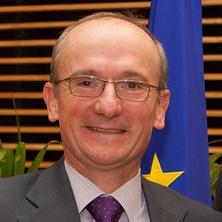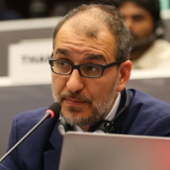Agenda
Timings are in CEST
-
Welcome and introduction
- Session 1: Enforcement Overviews from Europe
-
Moderator
- 1A: EU Level Enforcement Issues
-
Keynote Enforcement aspects of the EU’s chemicals strategy for sustainability and new enforcement indicators for REACH and CLP
-
Interlinks - Cooperation on enforcement cases between NEAs and Echa
- Introduction of the new communication and cooperation processes on enforcement cases
- Between NEAs and Echa
- Spotlight on processes for enforcement of Echa decisions
- Information on Echa’s revised addressee policy and ensuing consequences for enforcement
-
Updates on the work of Echa’s Forum for Exchange of Information on Enforcement
-
Reach4Textiles: an initiative to support market surveillance for textiles products
 Mauro Scalia
Director, Sustainable Business, The European Apparel and Textile Confederation (EURATEX)
Mauro Scalia
Director, Sustainable Business, The European Apparel and Textile Confederation (EURATEX) -
Potential of a grouping approach to improve effectiveness of the enforcement of chemicals legislation
- A ’no data, no problem’ approach, in particular for substances already on the market, is leading to deficiencies in classification and labelling of substances, and can hamper effective restrictions and other controls on hazardous substances, for example PFASs
- One potential solution is an increased use of grouping, where substances are considered to have the hazard properties of the most hazardous chemical in a group of similar substances
- This could also incentivise delivery of safety information, unlike the current approach which can create a perverse incentive on companies to avoid/delay delivering adequate safety and use data
-
Q&A
-
Short break
-
Panel discussion on important enforcement issues in Europe
- What has enforcement achieved in the past ten years, and what achievements would you like to be talking about in ten years’ time?
- Do you expect the enforcement of the EU market surveillance Regulation to bring about a level playing field; if not why not?
- To what extent does enforcement need to focus on imports?
- How should chemicals restrictions on secondary material streams be best enforced?
- How could a clearer understanding of enforceability contribute to safer products on the market? For example, in recent restrictions on polycyclic aromatic hydrocarbons (PAHs)or tattoo inks is there infrastructure to enforce them?
- Do the planned changes for REACH registrations go far enough to ensure high quality dossiers?
Additional panelist:
-
Lunch
- 1B: Regional and National Enforcement Developments in Europe
-
Overview of recent enforcement projects in Sweden
- Enforcement of internet trade:
- Nordic project on enforcement of internet trade (2019)
- project on internet trade (2020)
- government assignment on problems with internet sales (2021)
- Cooperation with customs
- Restrictions in textiles, including the new carcinogenic, mutagenic or reprotoxic (CMR) regulation
-
Enforcement of chemicals regulations in Great Britain and Northern Ireland
- The GB legislative regime
- What has not changed
- What might change
- Hot topics / future priorities
- How Covid-19 has affected enforcement activities
- A view from Northern Ireland
 Mike Potts
Principal Enforcement Officer, Chemicals Regulation Division, Health and Safety Executive, UK
Mike Potts
Principal Enforcement Officer, Chemicals Regulation Division, Health and Safety Executive, UK_opt.jpg) Louis Burns
Inspector of Health and Safety, Health and Safety Executive for Northern Ireland (HSENI)
Louis Burns
Inspector of Health and Safety, Health and Safety Executive for Northern Ireland (HSENI) -
REACH and CLP inspections in Italy and Germany: a comparison
- Enforcement work in Italy and Germany: main weaknesses and strengths
- How the relevant authorities carry out the enforcement
- Future development of enforcement at national level
- An overview of the main hot topics in both countries with a specific focus on:
- on-line sales
- End of Waste and REACH
- other future developments currently envisaged
-
Q&A and panel discussion
-
Refreshments and networking
- Session 2: Implementation and Enforcement of Chemicals Legislation from a Global Perspective
-
Moderator:
-
Global enforcement trends for packaging and packaging waste
- Introduction, history and background
- Extended producer responsibility
- definition and general tends
- two main models (municipal reimbursement and full producer responsibilities)
- Discussion of plastic taxes
- New packaging comparison chart
-
Enforcement of chemical legislation from a consumer perspective: risk perceptions and consumer behaviour
- Public perception of toxicology/chemical substances (differences in risk judgment between experts and lay people, what does “intuitive toxicology” mean?)
- Adults' perception and decision making regarding hazardous chemical household products (eg, role of warning labels/GHS symbols and other product attributes for risk perception/behaviour, misconceptions and misunderstandings regarding risks and hazards)
- Children’s interactions with hazardous chemical household products (eg, grasping behaviour, perception of parents of preschool children)
- Implications for enforcement and public risk perception
-
The implementation of GHS 1
Working towards the implementation of GHS at a global level
-
The implementation of GHS 2
Case study: the implementation of GHS in Kyrgyzstan, which has just received the Future Policy Award 2021
- Purpose and objectives of Kyrgyzstan state policy on chemical hazard classification
- System and hazard information requirements
- Key features
- Impacts
-
The implementation and enforcement of the Chemical Control Order for Lead and Lead Compounds (CCO, 2013-24) in the Philippines, which has just received the Future Policy Award 2021
- Legal framework on chemical management in the Philippines
- Lead and Philippine policies on leaded paints
- What prompted the development and adoption of the policy?
- How was the policy developed?
- Who are the key players?
- Implementation and milestones
 Edwin Romel Navaluna
Supervising Environmental Management Specialist, Environmental Management Bureau-Department of Environment and Natural Resources, The Philippines
Edwin Romel Navaluna
Supervising Environmental Management Specialist, Environmental Management Bureau-Department of Environment and Natural Resources, The Philippines -
Q&A
-
Short break
-
Panel discussion: The role of enforcement in tackling global chemicals management issues
- What is the role of enforcement at the national and regional levels in tackling global discrepancies in chemicals management?
- Do the OECD and UNEP publications and guidance documents on best enforcement practices help countries develop/enforce national chemicals and wastes legislation?
- What needs to be done to make significant improvements in tackling the illegal trade in chemicals?
- Are there good examples of enforcement of chemicals management rules by trade blocs?
-
End of day one









.jpg)
_opt.jpg)



_opt.jpg)


